One Day Off: Episodes 5-8 (Series Review)
by Dramaddictally
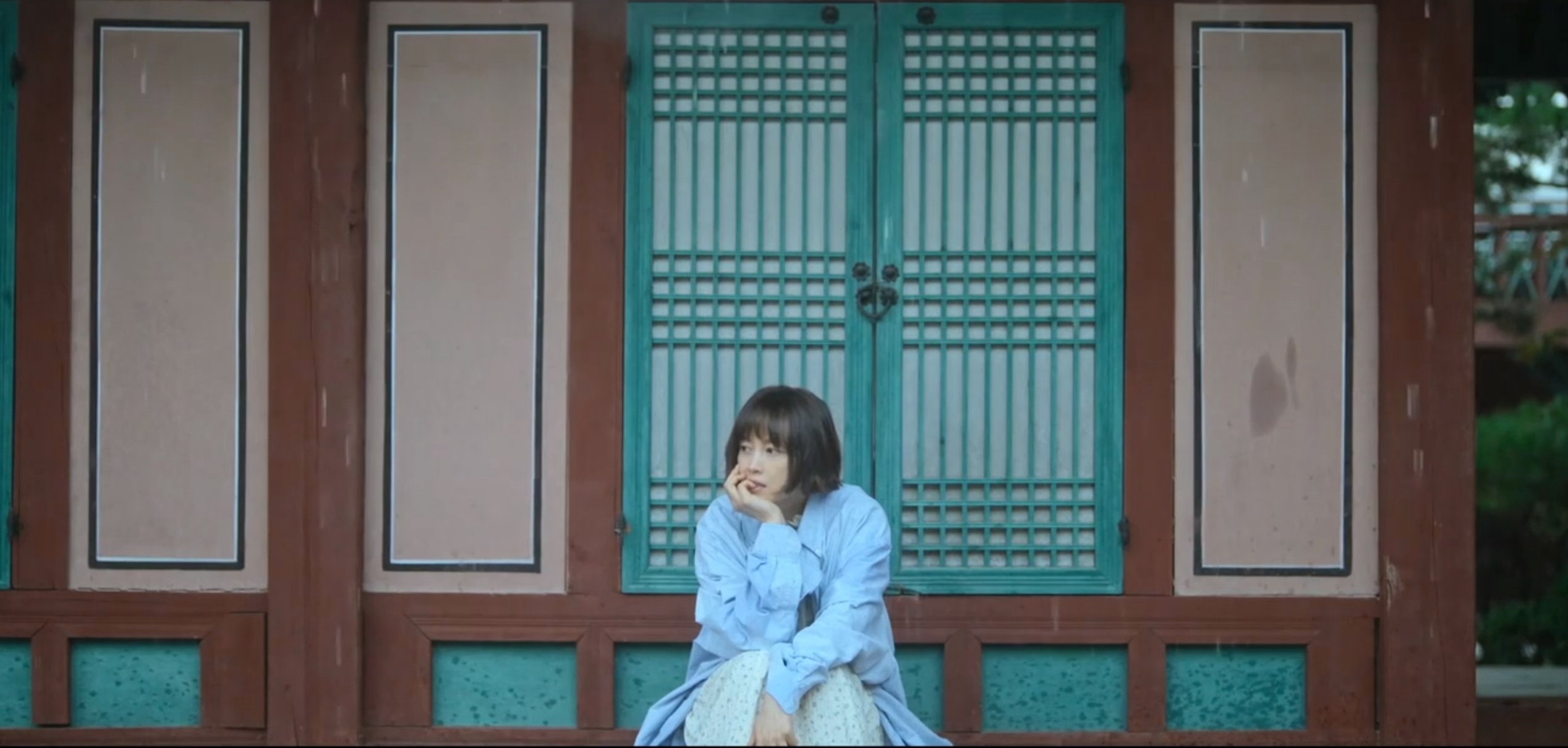
Our solo traveler continues her day trips as One Day Off takes a more philosophical turn in its second half. It’s as beautiful and strange as ever, with a conclusion that attempts to give it greater meaning, but somehow makes it feel a little smaller.
EPISODES 5-8
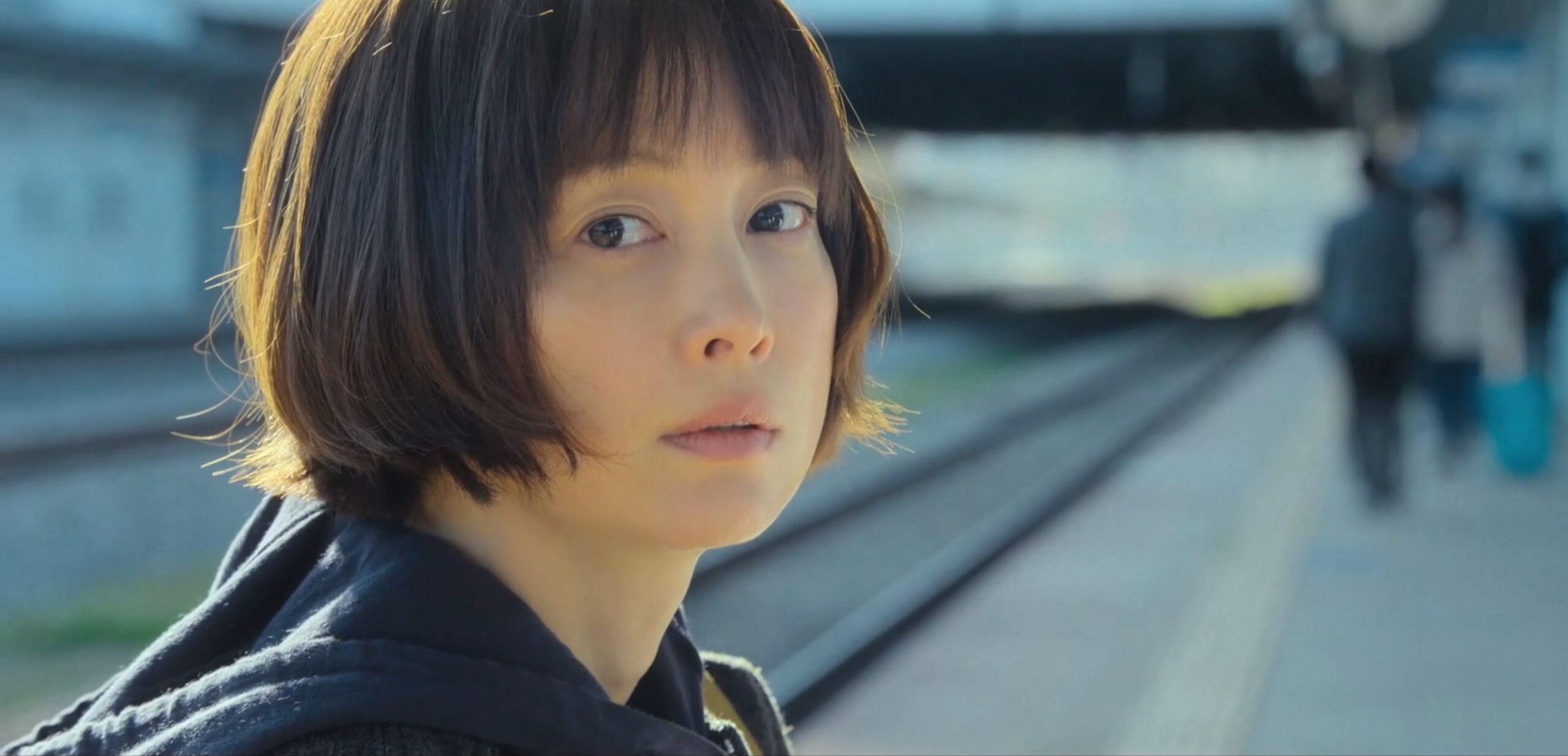
With questions about time and perception underlying these episodes, I’ll start by saying that I think this should have been a single drop so we could watch all eight installments at one time. The first four episodes had a bigger effect on me, but it’s hard to know if it’s only because I’ve had a week to build them up in my head.
Still, there is a possibility that the break was purposeful because we’re grappling with different themes this week. Where the initial four episodes felt like a meditation on society and our place within it, this last half feels like it’s expanded into questions of the universe — and maybe that’s why we begin in a planetarium.
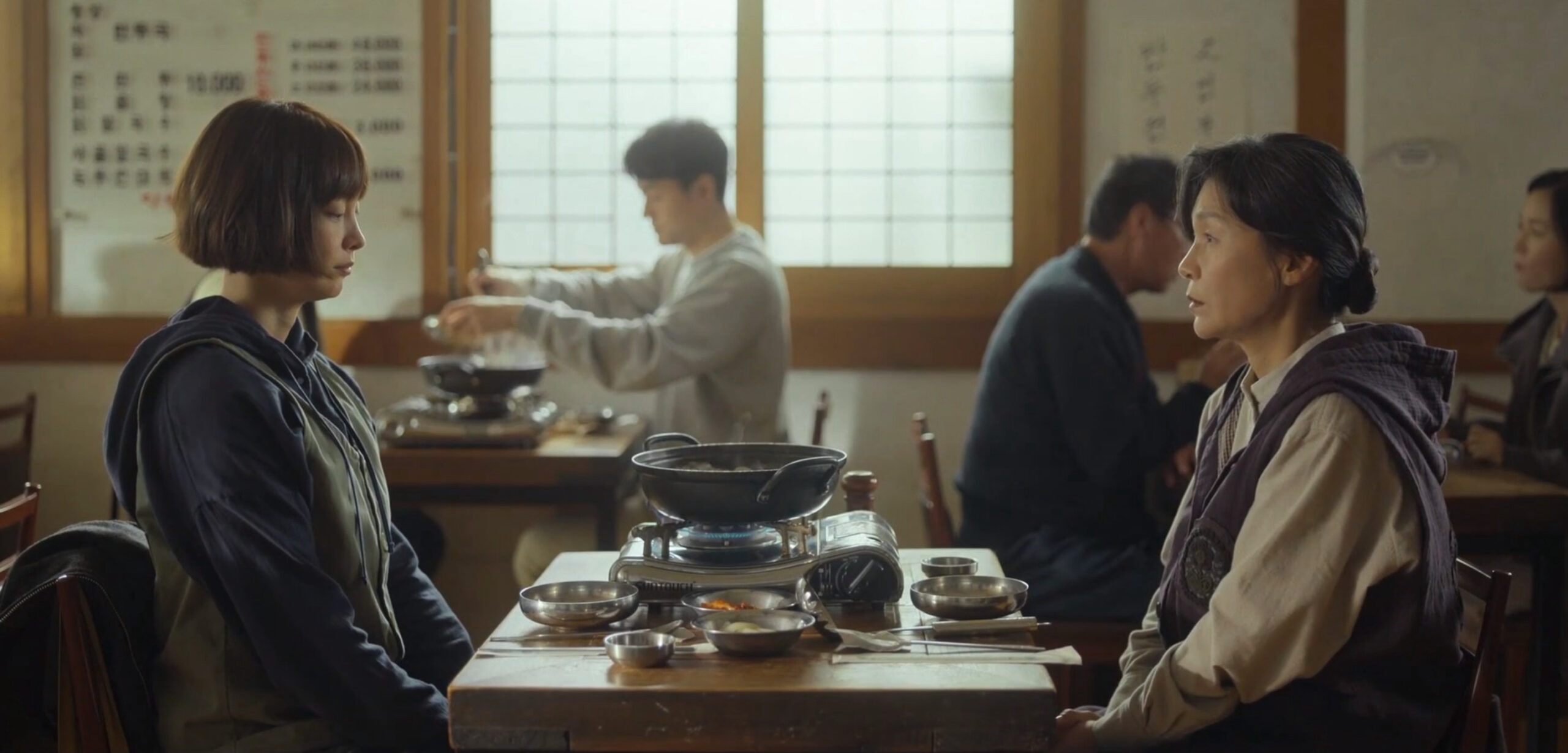
Like last week, each episode continues to tell a unique story and vary its visual storytelling methods. First up is Episode 5, which is told backward. It jumps around in time using the device of a VHS tape that’s rewound and then fast forwarded (in all its warped glory) to arrive at pertinent moments. The gist is that Ha-kyung has randomly met a woman while waiting in line for a restaurant, and she turns out to be GU YOUNG-SOOK (Gil Hae-yeon) — a children’s book author that Ha-kyung loved while growing up. The two decide to spend the day together and wind up at the local planetarium looking up at the stars.
Young-sook is flattered that Ha-kyung knows who she is but says that times have changed and no one is interested in old work like hers anymore. She then tells Ha-kyung an idea for a new story about the end of humanity — it runs on a time loop, so every day is doomsday on repeat. The result is that no matter how much the protagonist tries to fight it, the world always comes to an end. It’s at this point that our episode starts playing with time, just like in Young-sook’s story.
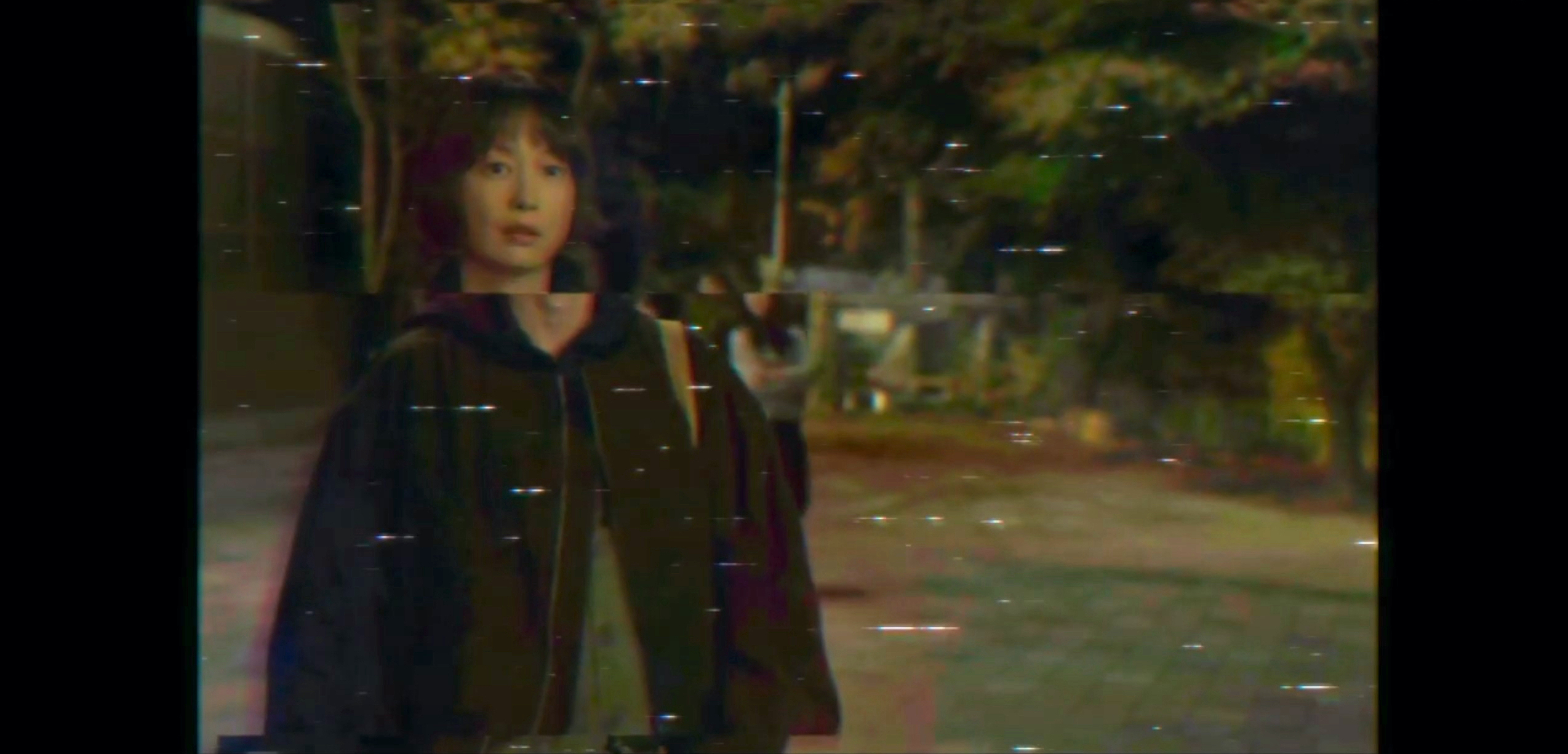
If this sounds a little depressing then you’ve understood the tone for this week with its themes of aging, death, ghosts, and the meaning of it all. But in the drama’s defense, it’s not meant to be a downer. It’s attempting to give the audience mindful advice to face these realities by telling us to “surrender to the contingency of time” and look for meaning in the smallest nooks and crannies of our existence.
When Young-sook tells Ha-kyung about the bodily struggles of getting older, she notes that she was foolish to work so hard when she was younger, sacrificing her health for little pay. She doesn’t feel her work was worth it in the end. But Ha-kyung corrects her, saying that her life’s work was worth it because her books comforted Ha-kyung when she felt lonely and misunderstood. It seems to be a reminder that meaning and value can come from affecting even one person positively.
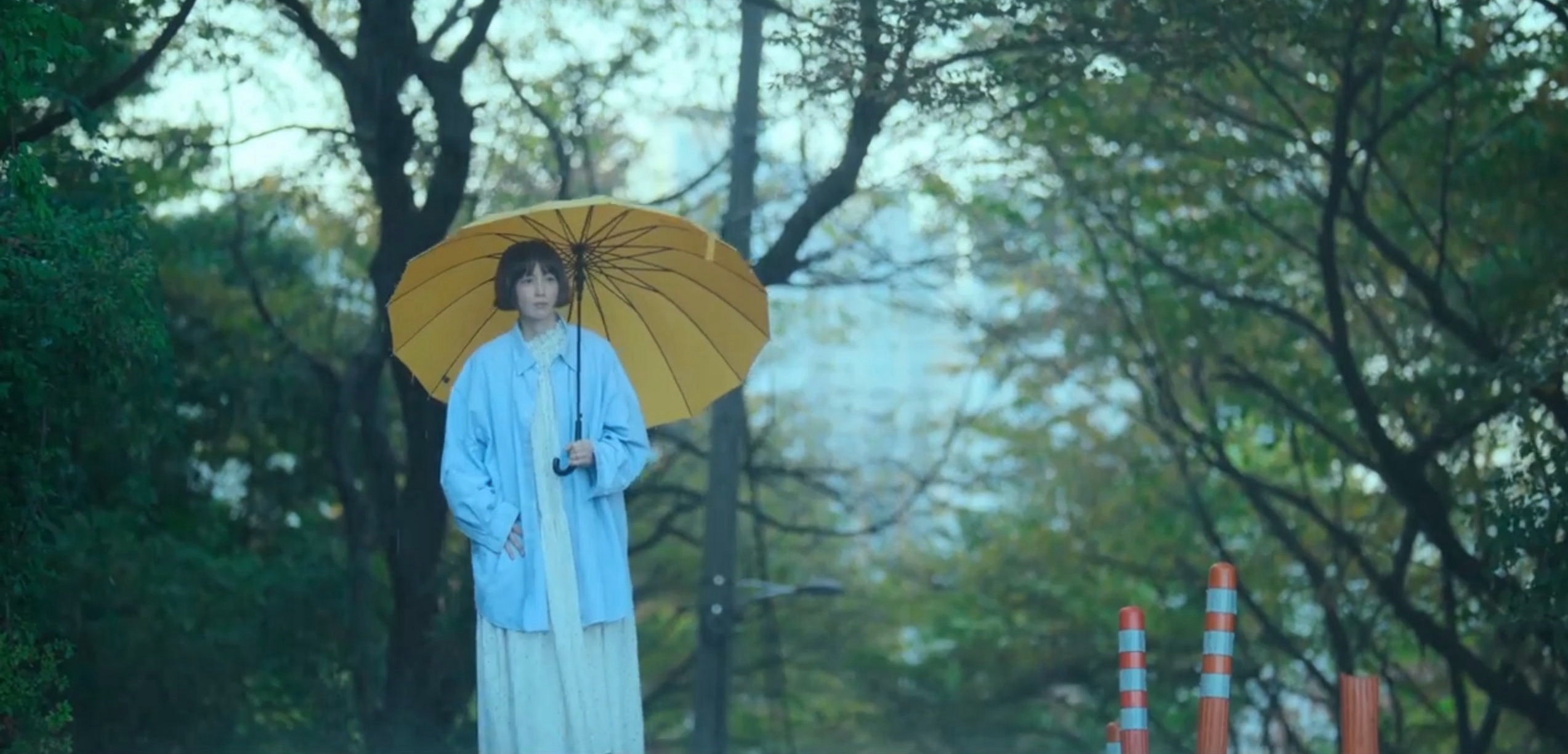
Episode 6 is maybe the strangest and most symbolic. It’s a rainy Saturday and Ha-kyung doesn’t travel far from home. She’s dealing with a crisis at work, where the parents of her students are all upset that the students have secretly organized online games, and they want the school to shut them down. Ha-kyung is torn between letting the students have their fun and following the school rules.
She wanders around (in what looks like a nightgown and rainboots) and ends up taking shelter from the downpour, aptly, at the Meteorological Museum. There she runs into a fellow teacher (Jo Hyun-chul) and they have a conversation about the difficulties of teaching, and how they can see the students’ perspectives more than the parents — maybe because they’re not parents themselves.
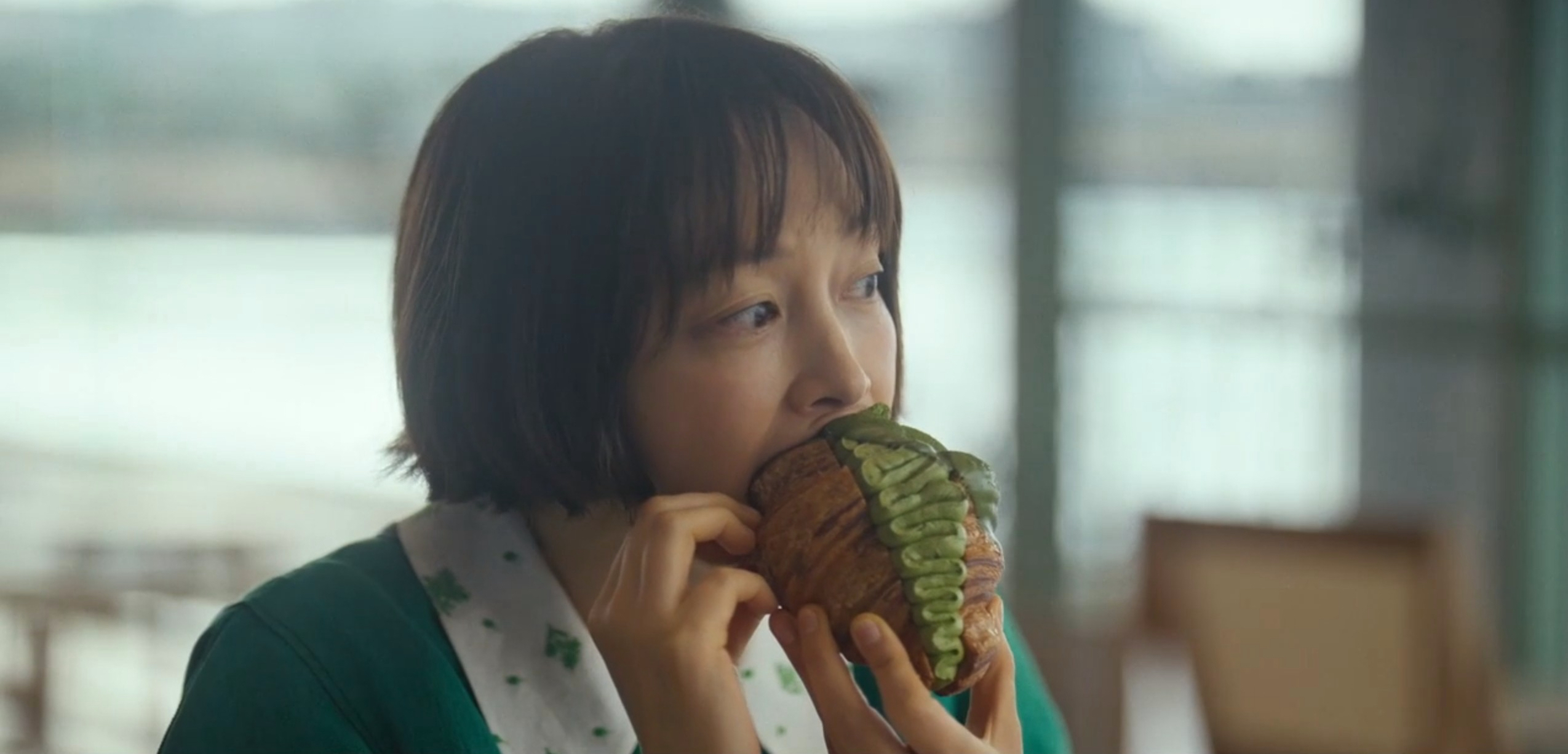
It’s not the first time this theme has come up about being stuck in a between space — not a child and not a grownup. And later on, in the final episode, Ha-kyung remarks that she’s aging but not growing up. It’s a comment about our always-failing mission to improve, instead of allowing the phases of life to just unfold, one after another, without wanting to become better each time. “It’s too hard to be grown up,” she says — which may sound like apathy, but I think Ha-kyung is making an active decision here, remaining staunchly in the middle.
Our next episode takes us to Jeju where we follow Ha-kyung on a bread tour. She’s obsessed with breads and has twelve bakeries on her planned list of stops. Her trip gets sidetracked, though, when a little girl comes into a shop and asks for “snail bread” and no one can figure out what she means. Ha-kyung ends up following the girl from bakery to bakery — looping back on the shops she’s already visited — to see where the girl goes.
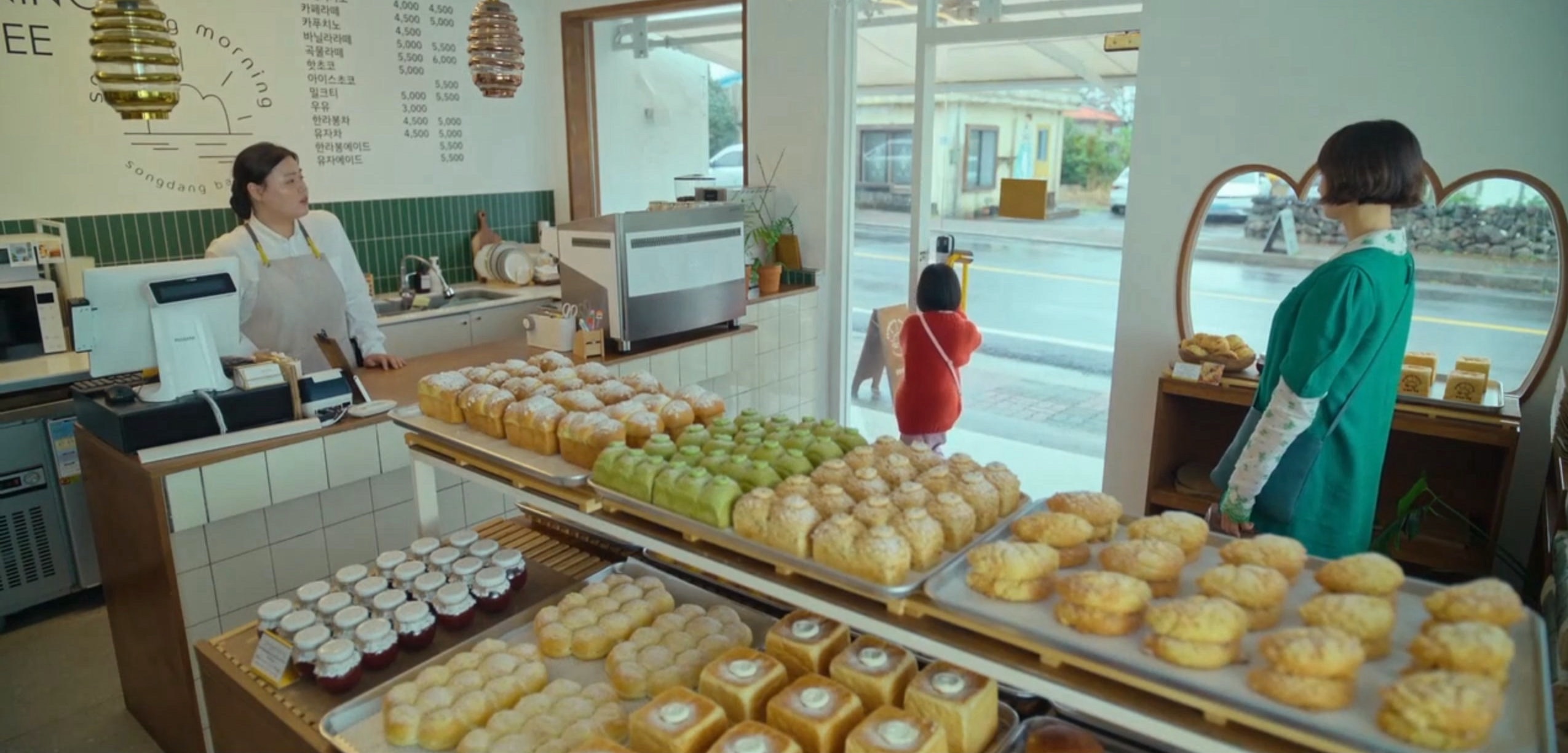
It turns out that the girl is looking for a specific cake roll and it leads Ha-kyung to find a place with sweet-tasting breads that wasn’t on her original list (i.e., it’s okay to go where life leads you sometimes). She follows the girl home and learns the little tike was searching for her mother’s favorite bread, so the family could serve it at the anniversary of her mom’s death.
This episode is visually fascinating as it has documentary-style interviews interspliced with a story that feels like a fairy tale. Bakery owners talk to the camera, answering questions about their business and the history of bread in Korea, while Ha-kyung tries (and fails) to stay out of the little girl’s sight as she follows her around town. Oddly, the girl’s grandmother is doing exactly the same. The whole thing feels fantastical, right up to the point where we see the mom’s ghost walking toward the house for the celebration.
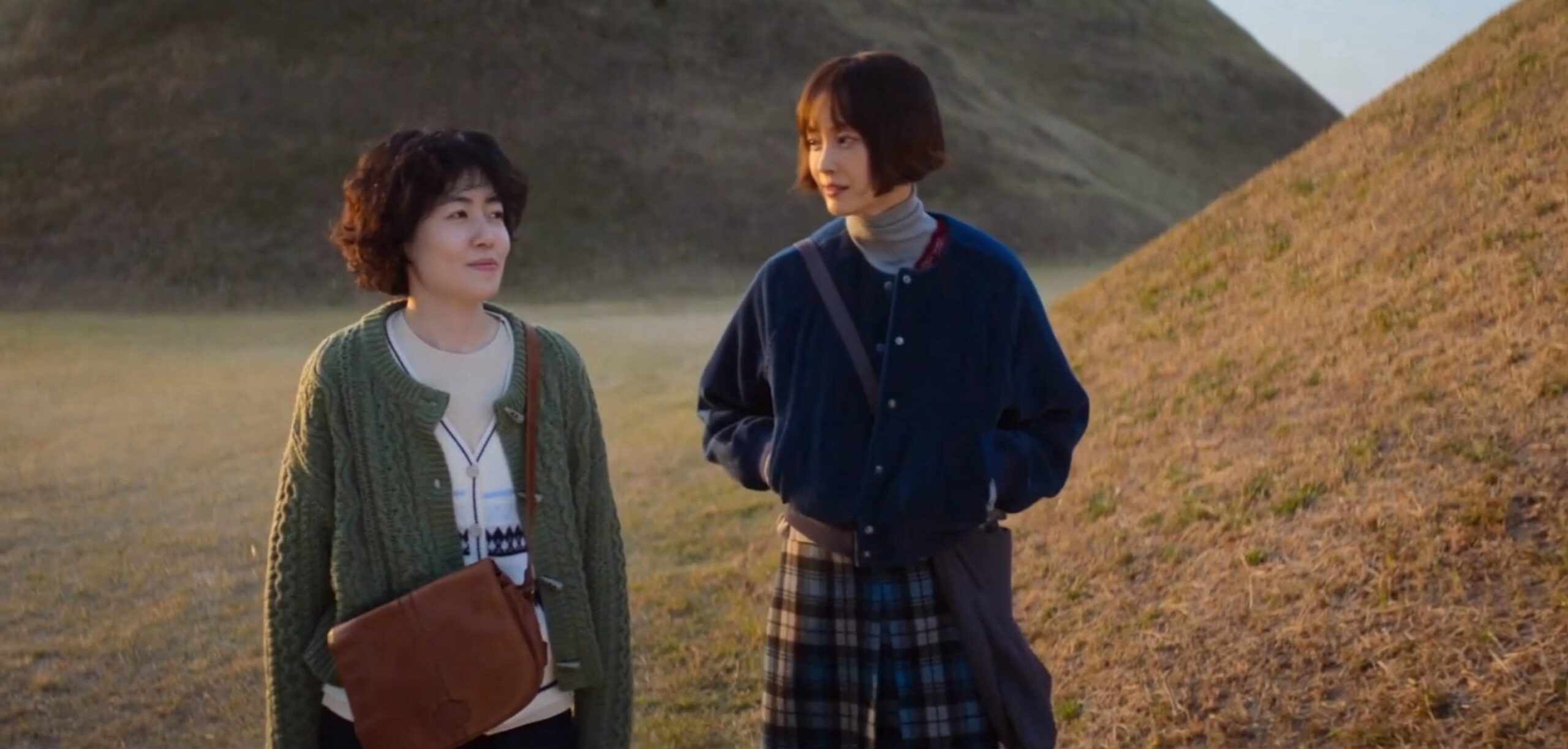
And that leads us to the final episode, which is all about a ghost. Ha-kyung travels to Gyeongju and we learn in flashback that she first visited the town on a school trip with her best friend LEE JIN-SOL (Shim Eun-kyung). Then, in their twenties, she and Jin-sol visited again. But after that, Jin-sol passed away. It was Jin-sol who loved taking trips, while Ha-kyung thought traveling was a hassle and hated hopping around to tourist sites.
This episode focuses a lot on reality versus perception as Ha-kyung wonders if time really starts to speed up as we get older or if it’s all in our heads. We see Jin-sol sit next to Ha-kyung on a bench, eat gimbap with her, and then embark on a wandering journey around Gyeongju where the two catch up. Is she really there? Or is it all in Ha-kyung’s head?
It’s not a mistake that their encounter is set in a place known for its burial mounds — the episode is ensnared in death. It’s partly about the death of Jin-sol, and partly about the pieces of Ha-kyung that died along with her. When Jin-sol jokingly says, “Park Ha-kyung halmeoni,” Ha-kyung is disturbed. She wanted to grow old with her friend, and now she won’t get to.
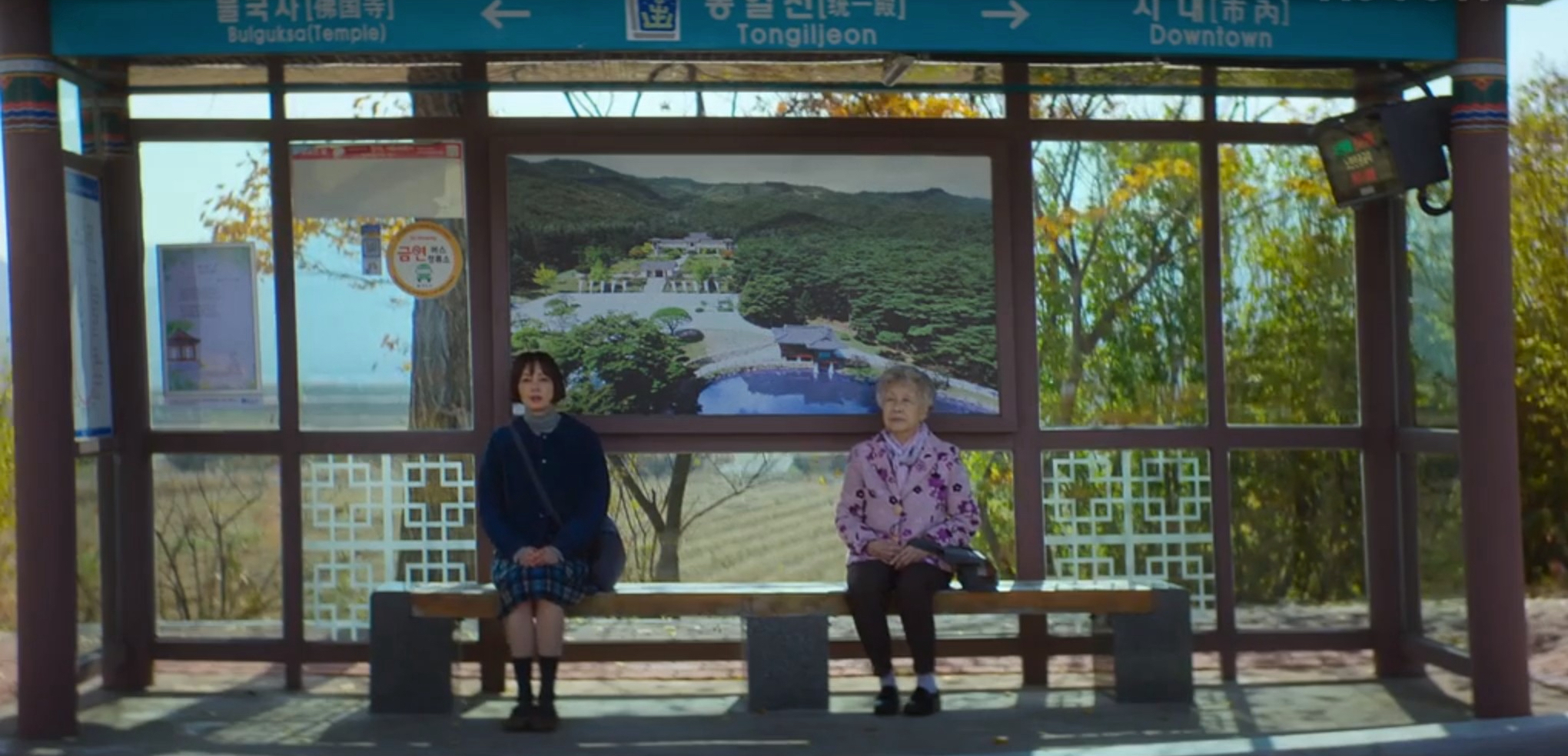
At the same time, it’s about death as a concept and a looming reality — and, ultimately, about how we can choose to spend our lives. Once Ha-kyung and Jin-sol say their goodbyes, we hear this inner monologue: “My time spent with Jin-sol made no difference. It wasn’t all that interesting or meaningful. All we did was shoot the breeze and loaf around. But that’s what made it fun.”
She goes on to say that “traveling” (which I’m guessing is a stand-in for living) is the same: it’s not altogether meaningful but there are moments of clarity, and that’s what makes it fun. “So, if you feel like disappearing, take yourself out somewhere. If you’re all alone, in a strange place, and you don’t feel brave enough, then make it last just one day. If you can walk, eat, and let your mind wander, you’ll be fine anywhere.”
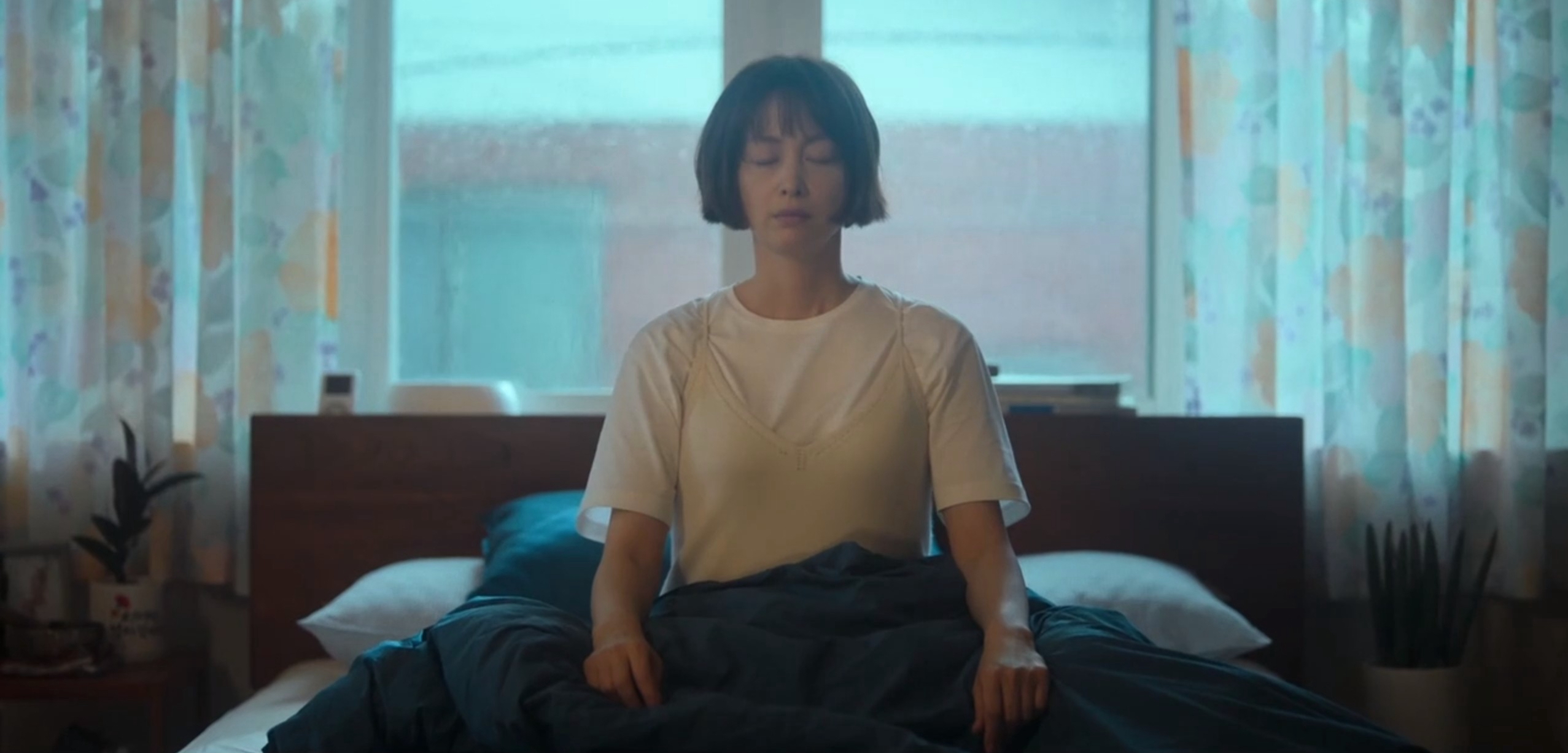
That marks the end of our journey with Ha-kyung. And I wish it left me feeling more uplifted. Initially, I felt let down by the retroactive framing of the final episode and the decision to motivate Ha-kyung with a sad backstory. It seemed to take away from the grander idea that she travels around whimsically, while we’re left to guess whether it’s a state of madness or enlightenment that propels her — which is the premise that Episode 1 set up.
But the more I thought about it, the more I decided that she needed that inciting incident to make her confront death and therefore her life. While I do still think the backstory grounds the show more than I would have liked (I preferred it in the realm of ideas), I appreciate the spirit it’s trying to achieve by making this one woman’s journey. Ha-kyung isn’t a character who has given up on life and is trying to escape it — she’s one who’s decided to take action in spite of the seeming meaninglessness of it all.
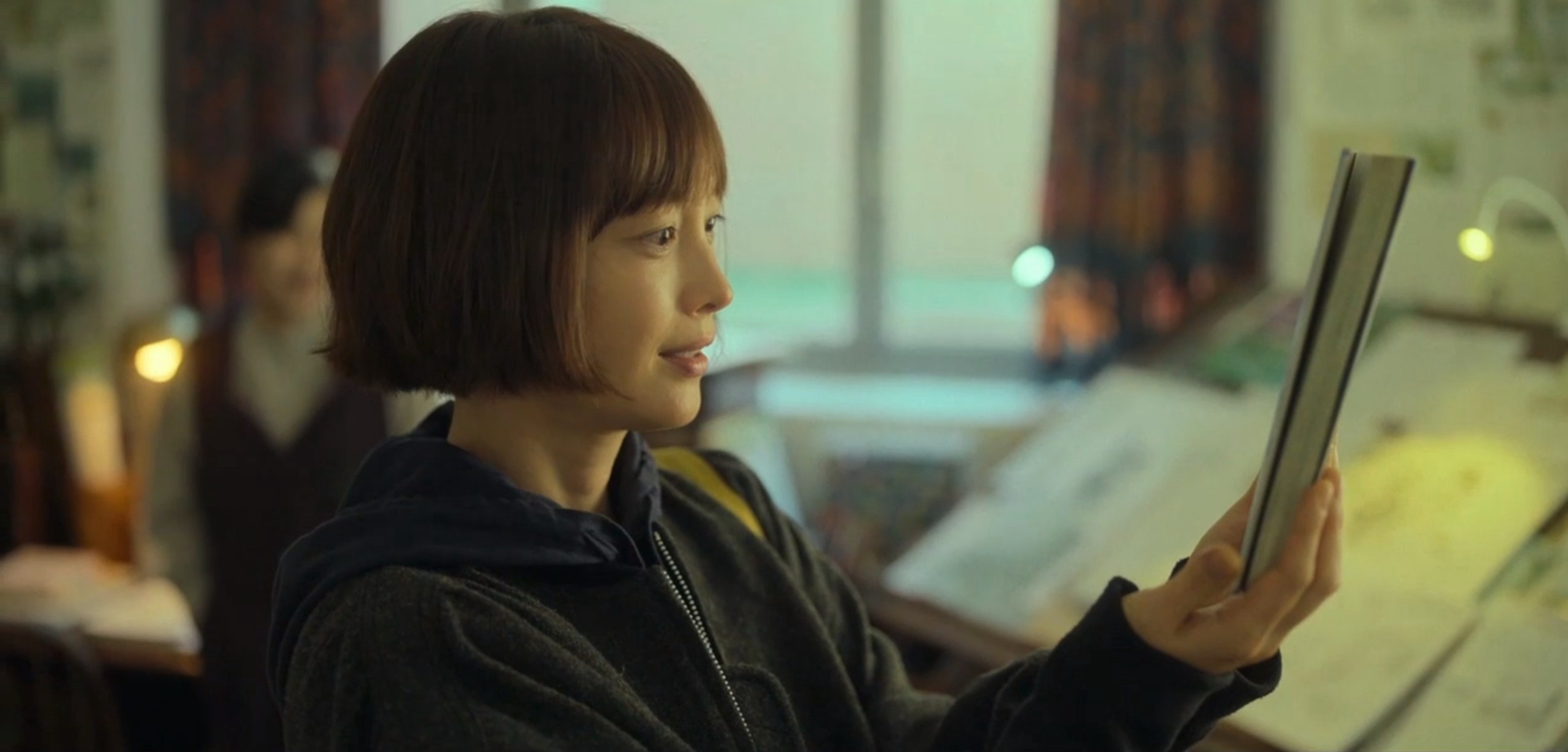
Her actions are small, one-day trips that connect her with other people, however fleeting. Even when she feels like doing nothing, she goes out anyway. And we’ve seen that it’s not just about injecting meaning into her own life, but into the lives of those she encounters too. She makes an impact on the children’s book author, on the elderly couple she argued with in the bus station, and on her students — particularly Han Ye-ri’s character, who Ha-kyung encouraged to pursue art, not so she could become an artist, but because she loved making art. Again, it’s about the journey, and not about where you end up.
Overall, I loved this drama. And when I say that the final episode is my least favorite, it’s because of the incredibly high bar that all the other episodes set. Apart from the story and themes, the diverse, experimental storytelling is phenomenal. Each episode gave us new characters and places, but also new methods of getting to know them. And the music choices varied as much as the visuals, from jazz to opera to chansons, accreting the layers of fun. Because no matter how dark the themes got, that’s what the drama aimed for: beauty, variety, and fun — all the elements it’s nudging us to add to our lives.
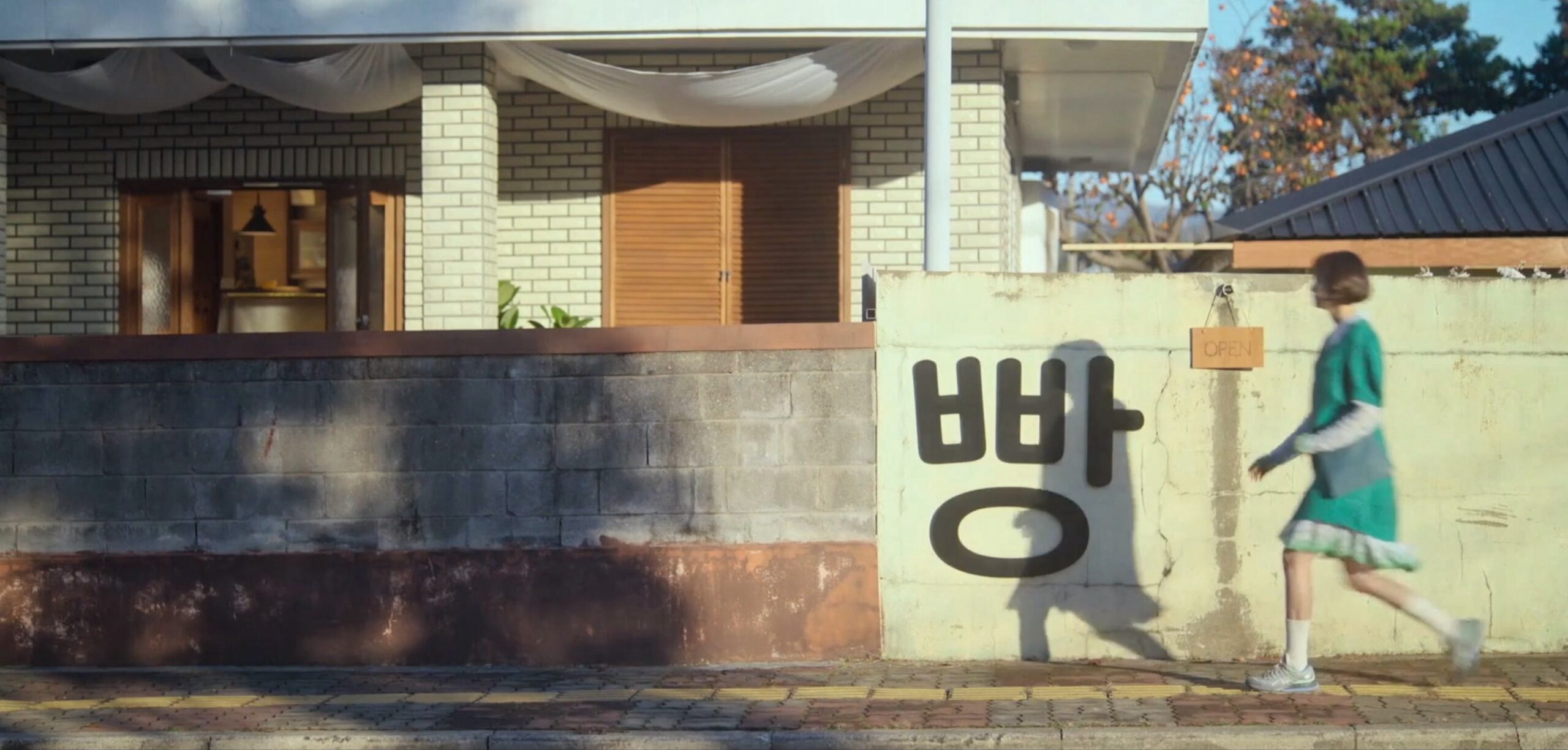
RELATED POSTS
Tags: Gil Hae-yeon, Gu Kyo-hwan, Han Ye-ri, Jo Hyun-chul, Lee Na-young, One Day Off, Park In-hwan, Seo Hyun-woo, Shin Eun-kyung
![[Cast Away] A psychometric marries his enemy to foil her plans](https://d263ao8qih4miy.cloudfront.net/wp-content/uploads/2023/09/castaway_header1.png)
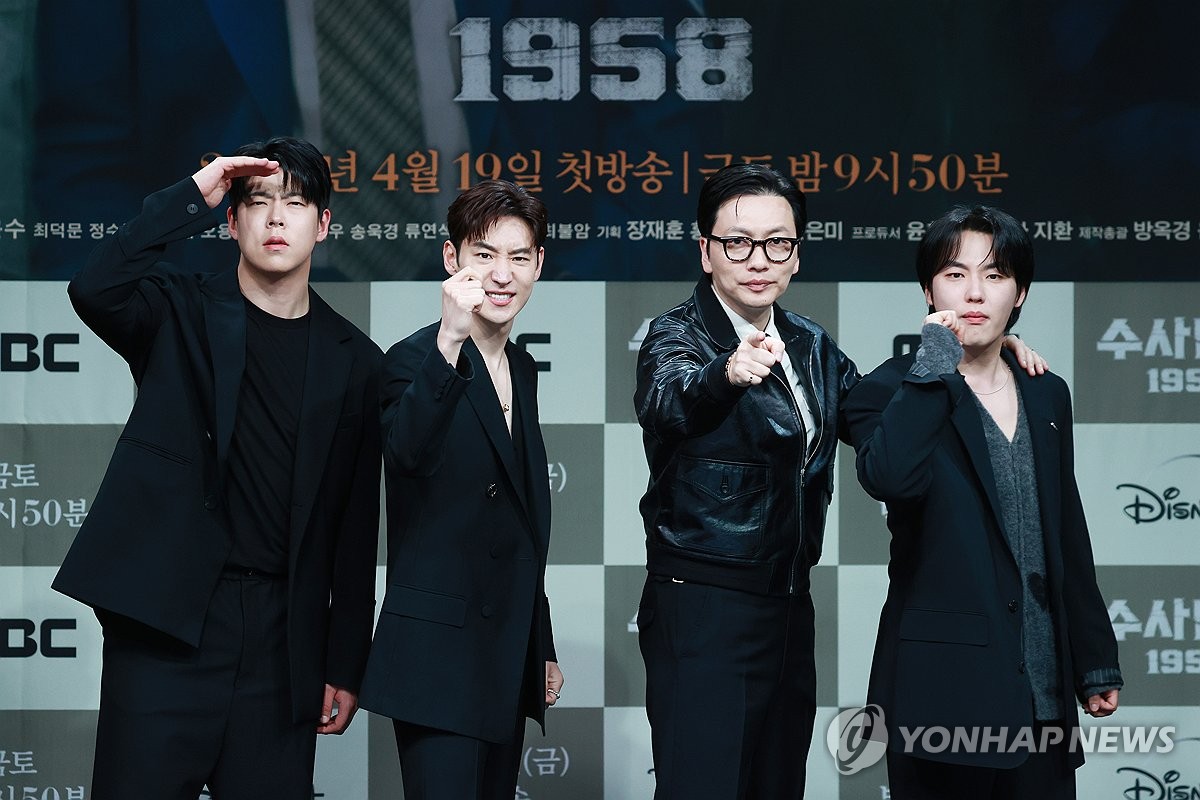
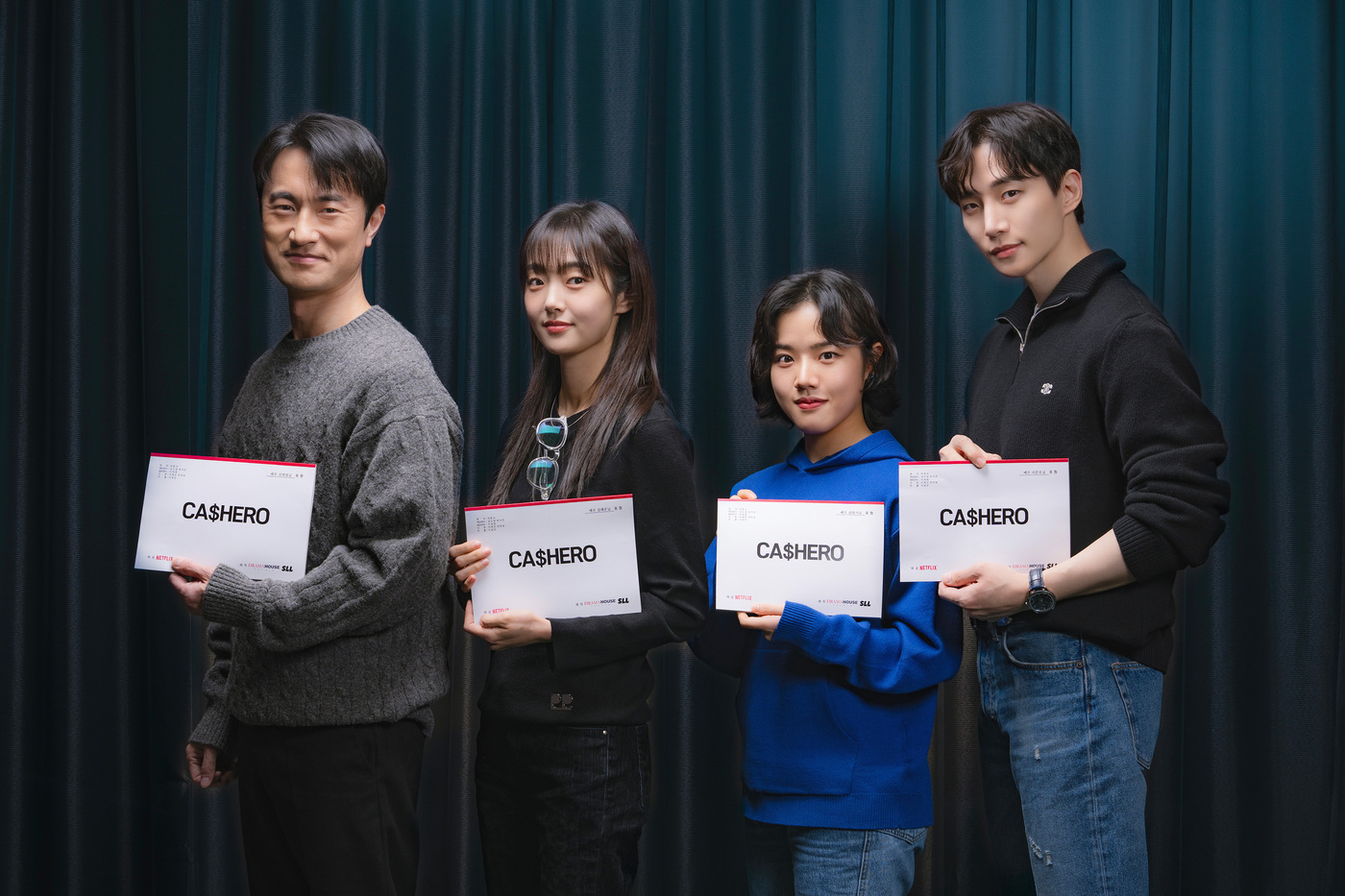
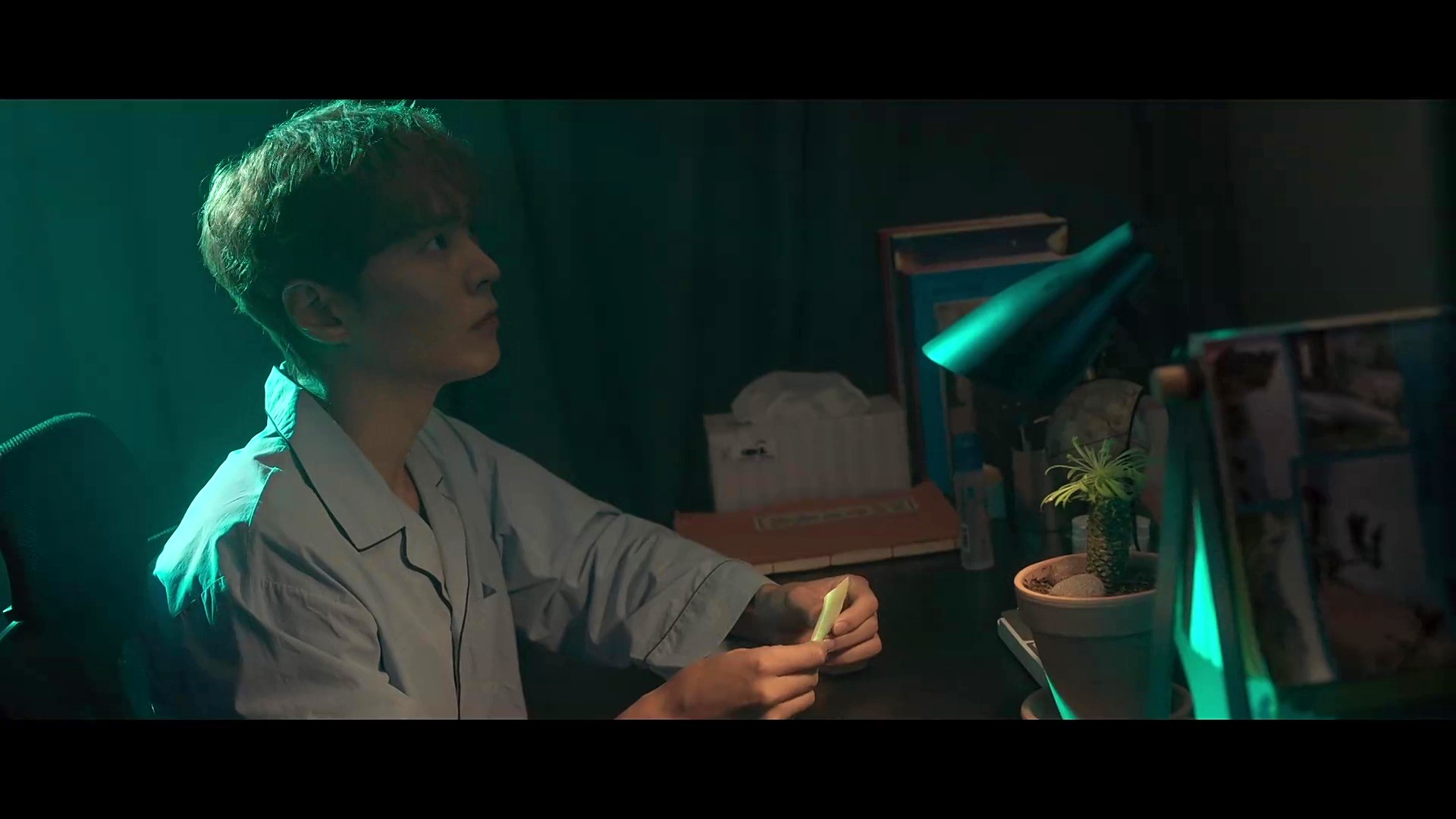
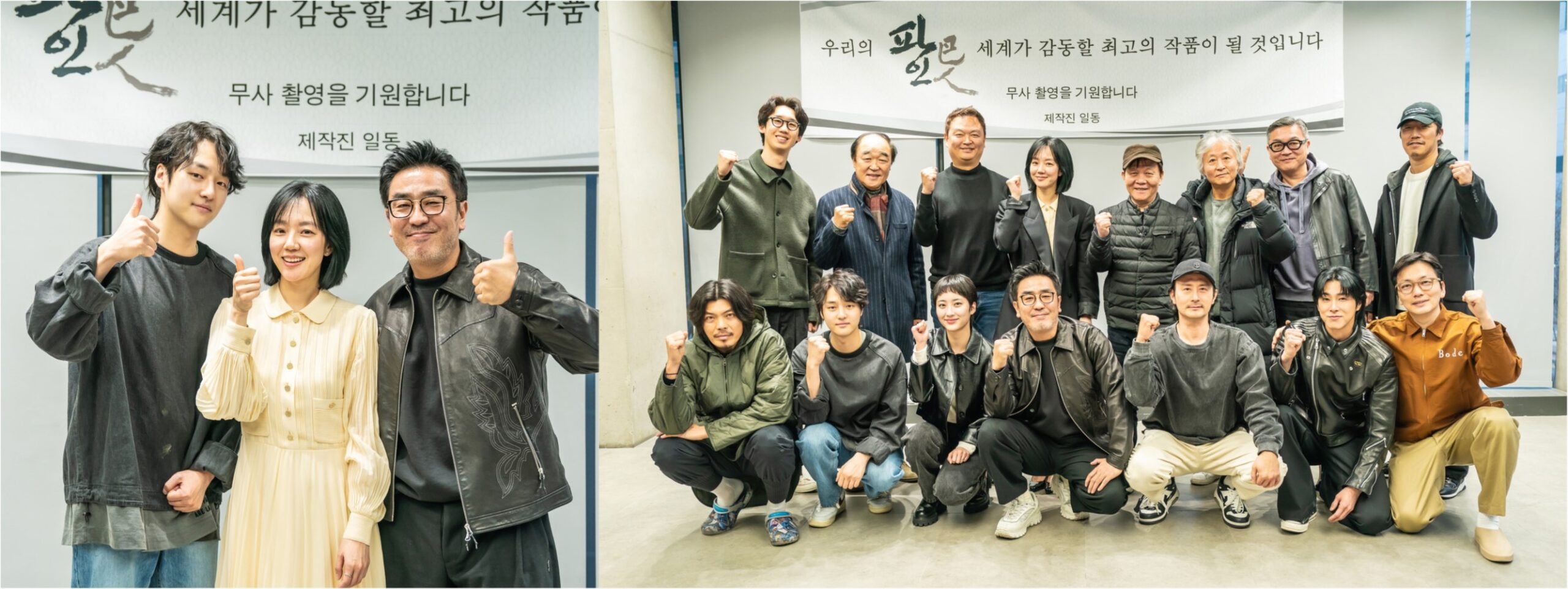
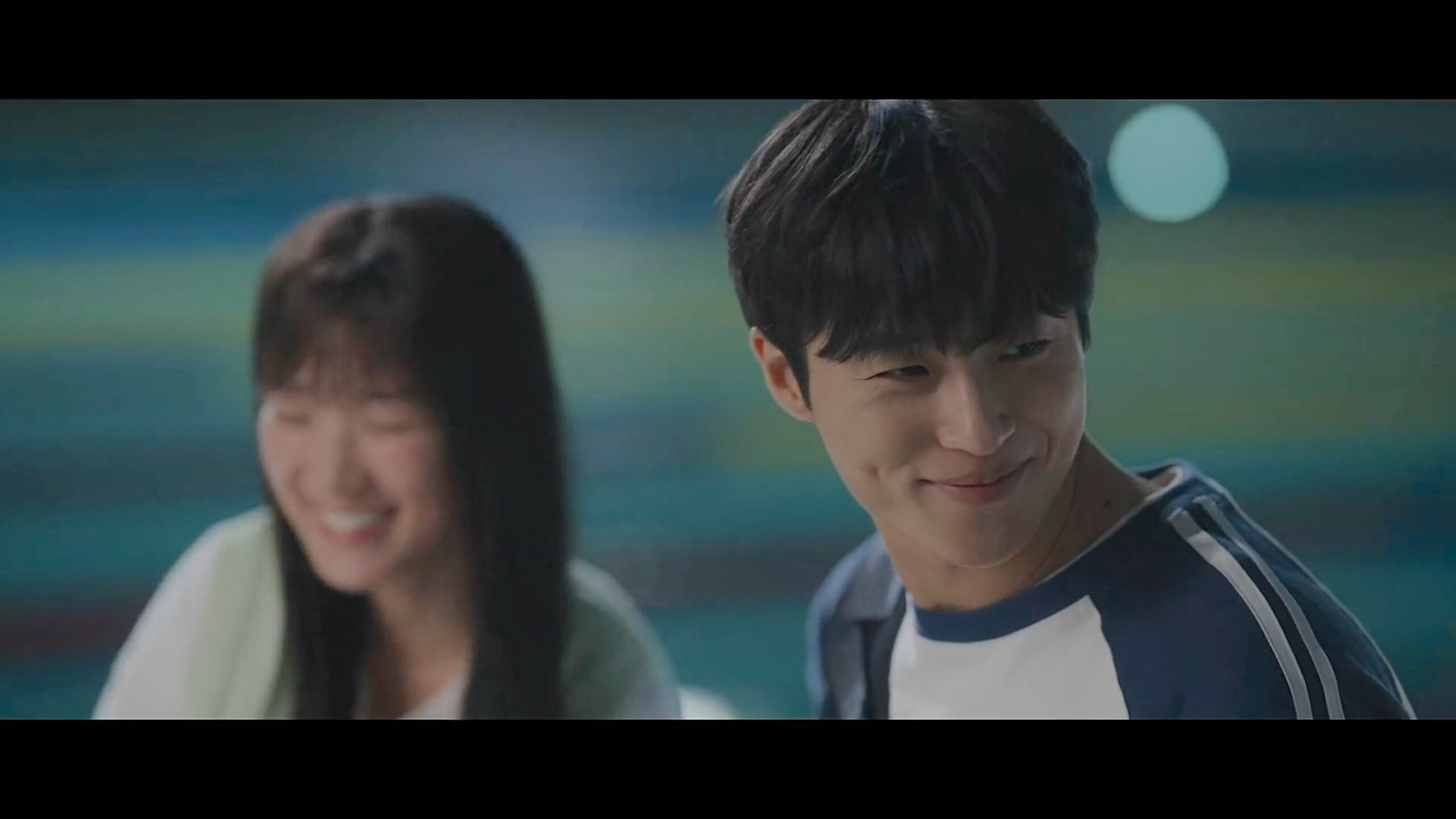
![[Beanie Recs] Dramas about fangirling](https://d263ao8qih4miy.cloudfront.net/wp-content/uploads/2022/05/BeanieRecs.jpg)
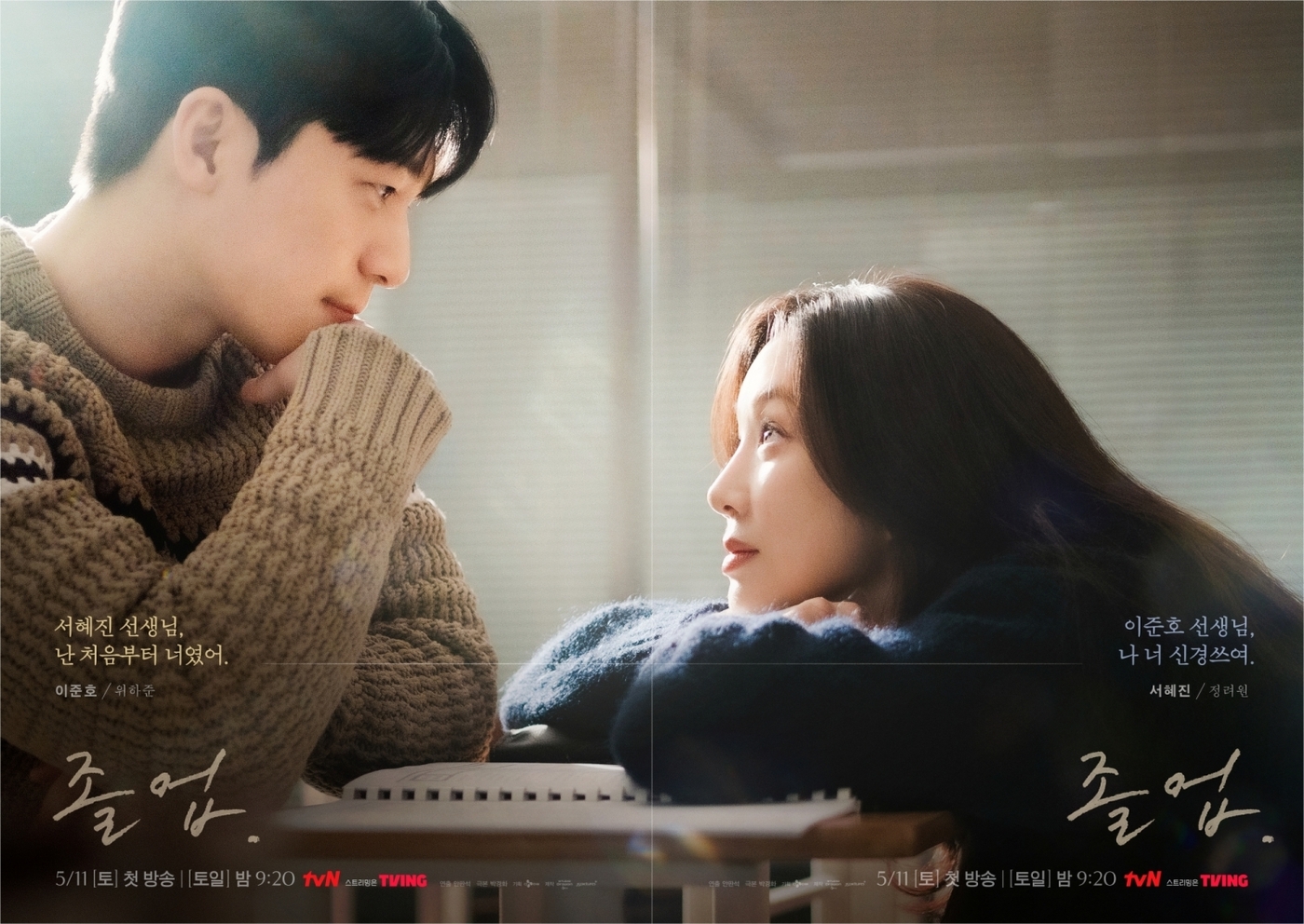
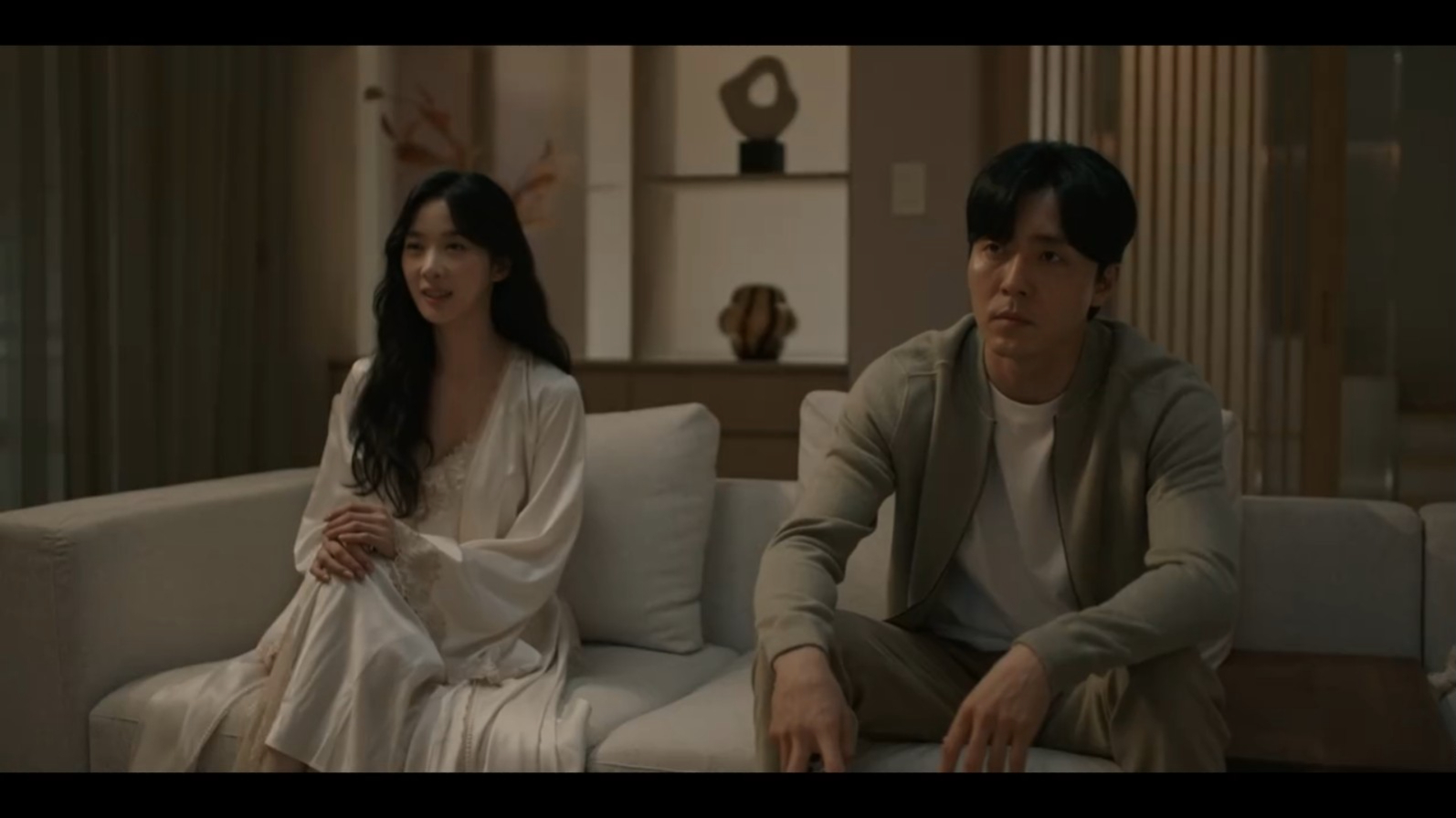
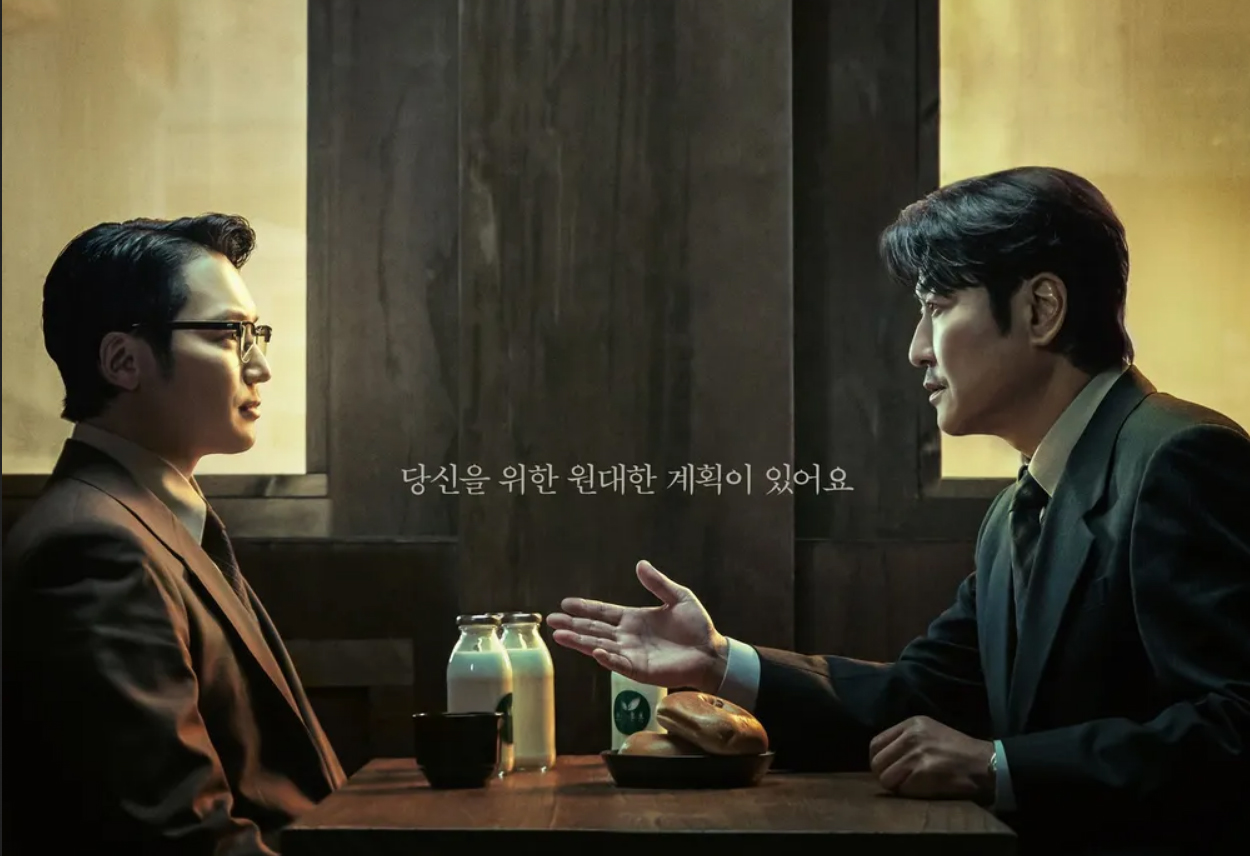
Required fields are marked *
Your email address will not be published. Required fields are marked *
1 hacja
June 3, 2023 at 3:24 PM
Thank you again, @dramaaddictally for your thoughtful recap. I really do appreciate your two reviews of this show, which made me aware of it and got me to think about it some more.
I agree that these 4 episodes brought a shift in perspective, from different experiences in society, to that of the characters personal experience. In that sense the split in episode drop was totally justified, so I take back what I said last week. As with the first 4 episodes, there are multiple interpretations possible, although what I am most impressed with is that the stories are not abstract explorations of ideas but really moving--the little girl searching for the bread that defined her mother's love, for example-that brought a tear to my eye. I would like to say a lot about each episode, but I'll try to restrain myself.
The first episode, on time, contingency, and the impact of choices, I found the most abstract; the second I'll expound on below; the third was great on the emotional meaning of food, and I agree, the fourth tried to wrap it up a little too neatly, but still, it dealt really well with the loss and regret.
I apologize if I sound really pompous here, I am not, just enthusiastic in thinking about the themes, and frankly, since I've already bored my wife with this, there is no where else I can expound on this show. While I found the first four episodes the most intellectually engaging, I have to admit that these last 4 hit pretty hard for me personally, because I'm older, recently retired, have thought a lot about chance, what I would do differently, about my teaching career, and what I'd say to lost friends and relatives-- and I myself love bread and have baked it for decades.
In fact not knowing that this would be one of the themes of the episodes earlier in the day I had baked a whole wheat walnut-date bread, and the smell was a kind of sensory adjunct to watching this episode, like John Waters the outré filmmaker's scratch and sniff "smell o vision" although mine was a lot more pleasant!
Required fields are marked *
hacja
June 3, 2023 at 3:28 PM
I will confine my analysis to the 6th episode, which was my favorite of these last 4, since I read it as being mostly about teaching and working with young people. Her getaway plans disrupted by rain, she also was getting called by her administration and the parent leader, demanding that she do something about the students scheduling a gaming tournament as an official school activity.
In her walk, this is represented as a distasteful intrusion on her time, with the worm that landed on her shoe as she is looking at her phone. She then has to deal with this issue while visiting two traditional sites for boring school field trips, and in fact she ran into the other teacher who was indeed taking his students on one of those trips. (He was a great character, by the way.) But his trip was not some boring tour just to learn about the weather. By taking art students to a weather museum, he is trying to get them to see the creative possibilities in the environment that surrounds them.
In connecting his struggles with teaching, and knowing what to do with students, to the dilemma of whether to save the worms who come out after the rain, which might end up dead on the sidewalk, he might seem to be making a disgusting comparison, but I read it as trying to decide how much to interfere with a natural process, whether its worms brought out by rain, or kids growing up and exploring their options.
In the end, Ha-Kyung doesn’t interfere in the student’s gaming tournament, and that is the correct teaching decision; she is also helped out by another student, who in a representation of the way students assist teachers, lends her money to get home; she doesn’t “save” the worm, the rain resumes and life goes on. I found it just a wonderful little anecdote with subtle connections to teaching.
Required fields are marked *
emsel
June 3, 2023 at 9:18 PM
But she did save the worm using a stick and threw it to the side after seeing how it survived a car runover.
Required fields are marked *
hacja
June 3, 2023 at 9:58 PM
Yes, you are right, I missed the move from the road to the leaves. So maybe my whole interpretation is wrong after all!
Required fields are marked *
Dramaddictally
June 7, 2023 at 10:06 AM
@hacja Whether your interpretation is “right” or “wrong”, I have no idea – but I will say I read Ep. 6 the same way you did.
Just like you, I took it to be about how much the teachers should interfere, and in my notes I went so far as to see the worms as representing the students.
The analogy being: like the worms, the students are drowning (in their studies) and when they come up for air, both risk being smushed down again anyway.
Seon-ha
June 28, 2023 at 7:07 PM
Episode 6 was my favorite of the whole drama.
From her housecoat-dress covered by a man’s oxford shirt, to her clear need to just get out of the house, to her inability to avoid the cell phone (wherever you go there it is…even under a palace), the yellow umbrella, her walking the kingly path, her inability (although she tried!) to avoid her colleague/the other students, her dilemma, even her ambivalence, about what to do about this silly gaming tournament…to her then losing her umbrella and saving that worm, perhaps, because she could see it was authentically in danger there from humans, not just in danger from the elements.
Right, wrong, feh. There’s so much space in these episodes to ponder the way things actually are outside the human mind, a place indifferent to values…a place we can never quite access without the foggy lens of our brain.
Required fields are marked *
hacja
June 29, 2023 at 6:56 AM
Much more sophisticated analysis than I’m capable of! I really do like this show though, for its simplicity of storytelling combined with its depth of theme.
Seon-ha
June 29, 2023 at 10:17 AM
@hacja, please.What malarkey! 😏
2 MikeyD signed up
June 3, 2023 at 4:02 PM
This is the season of flawed women. Bo-ra was vain and shallow and attention seeking, and also self aware enough to recognize her flaws. Ha-kyung is mediocre. She's a mediocre teacher, was a mediocre friend and a mediocre daughter, is even a pretty mediocre traveler. But she's learned to glean snatches of insight from it all.
Episode 8 when Ha-kyung's dead friend asks what music she's listening to she said she listening to something 'trendy but feels old-school'. Autumn 2022? Ha-kyung is definitely listening to the group 'New Jeans'. Their music video 'Ditto' was even set around the same time as Ha-kyung's high school flashbacks.
Required fields are marked *
hacja
June 3, 2023 at 5:41 PM
This is definitely right, both on the character and on Ha-Kyung's listening. In fact, I took a look at New Jeans dance routine (not on their song Ditto, but on OMG, and I'm pretty sure its the one she's embarrassingly imitating at her school.
But also, given these flaws, I just have to pay tribute the acting of Lee Na-Young, who does a great job with this character. The only other thing I've seen her in, Romance Is a Bonus Book, I thought she was good in general, but utterly unconvincing in her love at the end for the male lead. Here however, I thought she was excellent in every episode.
Required fields are marked *
welh
June 5, 2023 at 1:22 PM
The show was promoted as being set in the 1990s, so I was slightly confused by a sign that said 2021 and the music.
Required fields are marked *
3 MikeyD signed up
June 3, 2023 at 4:22 PM
I had seen that episode 8 location before in a theatrical film, starring Shin Min-ah if I recall correctly. Let me look it up... well, there you go! The film's literally titled "Gyeongju", from 2014. I recall the same mounds shot from the same angle.
Required fields are marked *
4 pohonphee
June 3, 2023 at 7:26 PM
I love this. I love how it talks about something heavy like aging and death in such a lighthearted way. I find my self in better mood after watching this.
"Where di people in Seoul go after they died? There's no place like this (cemetery) in Seoul."
"For a place like Seoul, there's no place for death".
As i think death is a part of life, it is weird that a place as lively and vibrant as Seoul doesn't have a cemetry. Though it rational from a high land price POV.
"I'm not growing up, but aging. When younger, I didn't want to bother with anything. Now, life is more interesting. I'm amazed with everything".
Like aging is not something to be afraid of. I'm 100% agree.
Required fields are marked *
5 emsel
June 3, 2023 at 9:33 PM
The short time format for each episodes along with a simple exploration of heavier themes makes it an easy watch. The breads in Ep 7 made me want to pack my suitcase for a trip to Jeju Island and I couldn't get enough of Lee Na Young saying in korean that "If you can walk, eat and let your mind wander". It was soothing to hear it. Loved it! 10/10
@dramaddictally Thank you for the review. The last four episodes weren't as strange as the first episodes, which is why I think you were not as enthralled by the second half as with the first half. Also, I wouldn't call the 7th episode mom and 8th episode friend as ghost because the former was more of a symbolism and the latter was a fragment of imagination by Ha Kyung.
Required fields are marked *
6 MikeyD signed up
June 3, 2023 at 10:38 PM
The very end of episode 6 when a woman was suddenly by Ha-kyung's side eating her kimchi pancake without explanation. What did you think was going on in that moment? A sister? A previously unknow room mate? I had earlier picked up the hint that 'magical realism' wasn't out of the question in this series but that only expanded the possibilities.
Required fields are marked *
Reply1988 -❣️Mother Bean❣️
June 3, 2023 at 11:41 PM
If you have watched episode 8 and you go back to episode 6 you will know who the mystery woman is and understand her sudden appearance.
Required fields are marked *
7 Reply1988 -❣️Mother Bean❣️
June 3, 2023 at 11:33 PM
Thanks @dramaddictally for the weecap. I agree there was a very different feel to the two halves and I feel the week between prevented it being too jarring. A consistent theme was the backdrop of the beautiful scenery. There were some gorgeous aerial shots of sunsets and the sea. I involuntary exclaimed out loud watching that aerial shot of the Daereungwon Tomb Complex.
I liked episode 7 the best even though it brought tears to my eyes. The little girl was so determined to find that bread. She used to have the little roll and when she was the one buying the bread she gave her portion to the dog. It was so sad to see her bowing down at the mourning table of food. I keep encountering the women divers in my audiobooks and it is so sad her mum died while her child was so young.
On the whole I enjoyed the series with its mix of thoughtful reflection, beautiful scenery and humour. The humour was subtlety woven in; male teacher asking the students for cash and saying it wasn’t a mugging, her dancing not knowing she had an audience, her hiding behind the baguette style bread when the little girl caught her following her.
My brain could not switch off from wondering:
How she was going to store all those amazing types of bread as some of the speciality styles don’t taste as nice after being frozen.
Why children were allowed to play next to the burial mounds.
Why she left the food open to the elements on the bench but then went back to it some time later and started to eat it.
Required fields are marked *
8 Mrs Buckwheat
June 4, 2023 at 3:10 AM
Thanks Dramaddictally for your insightful comments.
I love everything about this show, it's superb and it feels all the more luxurious after quite a few kdrama disappointments this year.
I need season 2.
Maybe if I start a petition :)
Required fields are marked *
9 welh
June 4, 2023 at 4:38 AM
ONE DAY OFF (Ep. 5-8): Episode 5 is about Ha-Kyung chance to do something she thinks she is not good at but was too embarrassed to try: dancing. This is relatable to every viewer. There are things we would like to do, to try, to master but our own self-doubt stops us. It is funny that it sometimes takes a stranger to put you on your path. However the jumpy flashback editing style I felt was unnecessary until the introduction of the cartoonist and her ability to see how to get out of her own comfort zone to experience new things in the last chapter of her life. Ha-Kyung has a connection to the artist which quickly brings them together. The revelation is that we are all stuck in our routines and habits like a never ending time loop, unable to break the grind to do something more in one’s life. Instead, is a kimchi jeon is the perfect comfort food on a dark day?
Episode 6 is about how a rainy Saturday can bring you down, especially if work intrudes on your time off. It shows how “stuck” she is without much good luck; but around her are inferences of what kindness can do. One can view nature as controlling or as a companion; just as the Principal or PTA head is controlling something her students find as a break of their harsh routines: socializing with their friends. She finds herself in the middle and decides not to do anything, let it run its course like a rain storm.
Episode 7 introduces us to Ha-Kyung’s obsession: bread. We all have our own quirky interests but this one seems to suit Ha-Kyung. It is simple but elegant. And her bakery journey gets detoured by a young girl on her quest to find snail bread. We can tell Ha-Kyung sees her young self in this little girl who steadfastly searches for the “correct” bread so she can get her own treat. To me, it was not heartbreaking to see why the little girl was so determined to find the right bread to celebrate an important part in her life. It was comforting, just like bread is a comforting to many people..
Episode 8 can be summed up as “you don’t know what you are missing until it’s gone.” It really hit home when Ha-Kyung said she was not growing up but just aging. Her best friend, who was full of life, died at a young age. Ha-Kyung’s memories of their trips keeps her alive in her memory. Trips, like photographs and food, are tangible forms of memories that people hold dear because they are shared experiences that bond families and friends together. She said her time with Jin Sol was not deep or meaningful but fun. But it was meaningful enough for her to continue conversations with her. It is a powerful reminder that no matter how hectic, routine, or boring each day is for you, there are ways to make new memories if you try. But most people do not take stock of their lives until it is too late. Regret is a lingering pain in one’s life. It is hard to make new friends, it is hard to keep up with old friends. Work without play is not the way to live.
Her friendship with Jin Sol was a catalyst...
Required fields are marked *
welh
June 4, 2023 at 4:39 AM
...or her to wander (mentally in vivid daydreams and physically getting out of her comfort zone to experience new things.)
The series was an excellent reminder of the sentimental reasons why we have friendships, explorations into the world which uncovers new things about ourselves. I think Lee Na-young fit the role perfectly: from her hairstyle, dress to demeanor and expressions when even the little things can crossed her path had meaningful sparks in her introspective journey. It was a wonderful series to watch.
I think it also contained the greatest PPL of all time: Jeju Island and the bakeries. I think most of the bakers shown were the actual owners (making it a unique documentary within a drama). Each store was effortlessly woven into the story (another great performance by a Korean child actress.)
Required fields are marked *
10 kadota
June 4, 2023 at 1:14 PM
Guess I'm in the minority here as I enjoyed this set of episodes more than the first set.
I especially liked episode 6. It was just not her day - the rain, losing her card, forgetting her wallet - but she had a good talk with her colleague, the kids gave her bus money and she ended the day with a comforting pancake. Tomorrow is another day!
Required fields are marked *
11 MikeyD signed up
June 4, 2023 at 7:44 PM
The 'romance' episode (3) was as much about inexplicable loss as episode 8, but on a smaller scale. The pair inexplicably losing each other while looking out over the city, the guy inexplicably not showing up to the theater despite his enthusiasm. The same feeling of loss and longing over missed connections, much the same as the former school friend suddenly gone and leaving a void. The losses started in episode 1 with the cell phone left at the monastery, then graduated to bank cards and umbrellas, missed train connections, and finally to a lost school friend.
Required fields are marked *
12 Qingdao: likes scented candles
June 27, 2023 at 11:15 AM
This is the most unusual Kdrama that I have watched (140+ dramas). I would describe it as simultaneously deep & light, and beautifully filmed. I liked seeing the people she encountered on her journey as familiar guest stars and the unique places in South Korea. It was moving quirky, and enjoyable.
Required fields are marked *